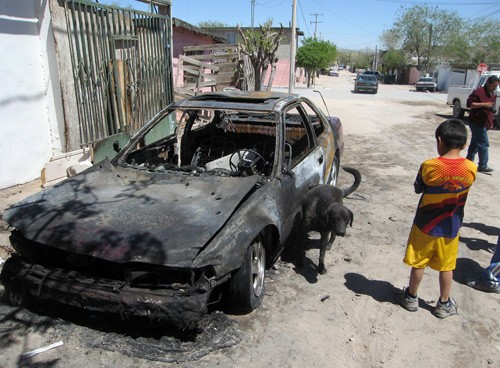CIUDAD JUAREZ, Mexico — Prison directorGerardo Ortizhas an armored car and five bodyguards at his beck and call. Still, he doesn’t leave the municipal prison here very often. It’s too risky.
Like the 2,800 inmates locked up in the Ciudad Juarez municipal jail, Ortiz is an inmate, too, of sorts. The only place he feels safe is inside the prison. So he sleeps in a small prison apartment replete with a punching bag to relieve the tension.
Ask him how long he’s served as the prison warden, and the answer comes quickly: “”Eleven months and 10 days.”” His goal: “”Leave here alive.””
Occupying a senior public service job along Mexico’s troubled border with the U.S. literally can mean facing death — especially in Ciudad Juarez, where rival drug cartels are at war and the homicide rate has soared.
Surviving each workday is an accomplishment. More than 100 municipal employees have been murdered since 2007, among them three director-level officials, the El Norte newspaper said early this year. The mayor, the prison warden, the public security chief and the human rights ombudsman all have bodyguards. Police chiefs along the border routinely quit after short stints, cooperate with drug gangs or are gunned down in the streets.
Interviewing these officials is an otherworldly experience. To reach them, one must get past layers of municipal and federal police armed with automatic rifles. City Hall is an armed camp.
From his spacious office, MayorJose Reyes Ferrizpeers out a window with a view across the Rio Grande to El Paso, Texas, barely a few hundred yards away. El Paso is a haven of calm, the second safest big city in the U.S., after Honolulu. Reyes won’t comment on rumors that his family maintains a home there.
“”It’s a joke. The law says he has to live in Juarez, but everyone knows that he lives over there (in El Paso),”” saidMiguel A. Fernandez, a former Coca-Cola bottler who heads a nonprofit group, Strategic Plan for Juarez, seeking to pacify and strengthen rule of law in the city.
Everywhere Reyes goes, he takes nearly a dozen bodyguards that comprise a virtual tactical SWAT team.
“”It’s very risky. You need to take a lot of precautions,”” Reyes said.
In mid-March, a severed pig’s head turned up near City Hall with a sign telling the mayor, “”You have two weeks left to live.””
Gustavo de la Rosa, the human rights ombudsman in Ciudad Juarez, was driving in the city one day last autumn when a man at an intersection cocked his hand in the shape of a pistol and pointed it at the human rights lawyer’s head. A few weeks later, one of de la Rosa’s guards was slain.
De la Rosa, 63, had pressed the military repeatedly to free citizens held without charges. His name also had turned up on a death list passed around in the Juarez Valley by an armed gang working for the Sinaloa cartel, one of the drug gangs fighting to control drug smuggling routes to the U.S.
Wasting no time, de la Rosa crossed with his family to El Paso.
“”I saw the need to change my situation because of the high risk of my position,”” he said.
Compounding his difficulties, when de la Rosa crossed from Juarez to El Paso after work on Oct. 15, U.S. border agents asked him if he feared for his life. When he replied “”yes,”” they took him into custody and placed him in a detention facility. It took six days before Washington ordered his release.
Only this month did de la Rosa resume his human rights work full time, traveling each night back to safety in El Paso.
“”Serving as a public functionary is a high risk occupation,”” he said.
Ortiz, 50, has spent two decades working as a warden in Mexican prisons, mostly near his home in Veracruz state. When asked to take over the municipal prison here, he left his wife and children behind.
“”My great advantage is that my family isn’t with me,”” Ortiz said, noting that freed prisoners can’t put pressure on them easily when they are 1,200 miles away by highway.
Among the inmates in the Juarez prison are members of death squads.
“”There are people in here who have killed 80, 90 or 100 people,”” Ortiz said.
In the past year, assailants have executed eight prison guards as they moved about the city after or before work, Ortiz said. The gunmen presumably were linked to one of the three major rival street gangs in Juarez. Each of the gangs has dozens to hundreds of members in the prison.
Even so, Ortiz said he feels relatively safe working and living at the prison, where federal police equipped with high-powered weapons can come to the rescue if danger arises.
“”Here inside, it is definitely safer than out there,”” Ortiz said, signaling toward the city.









